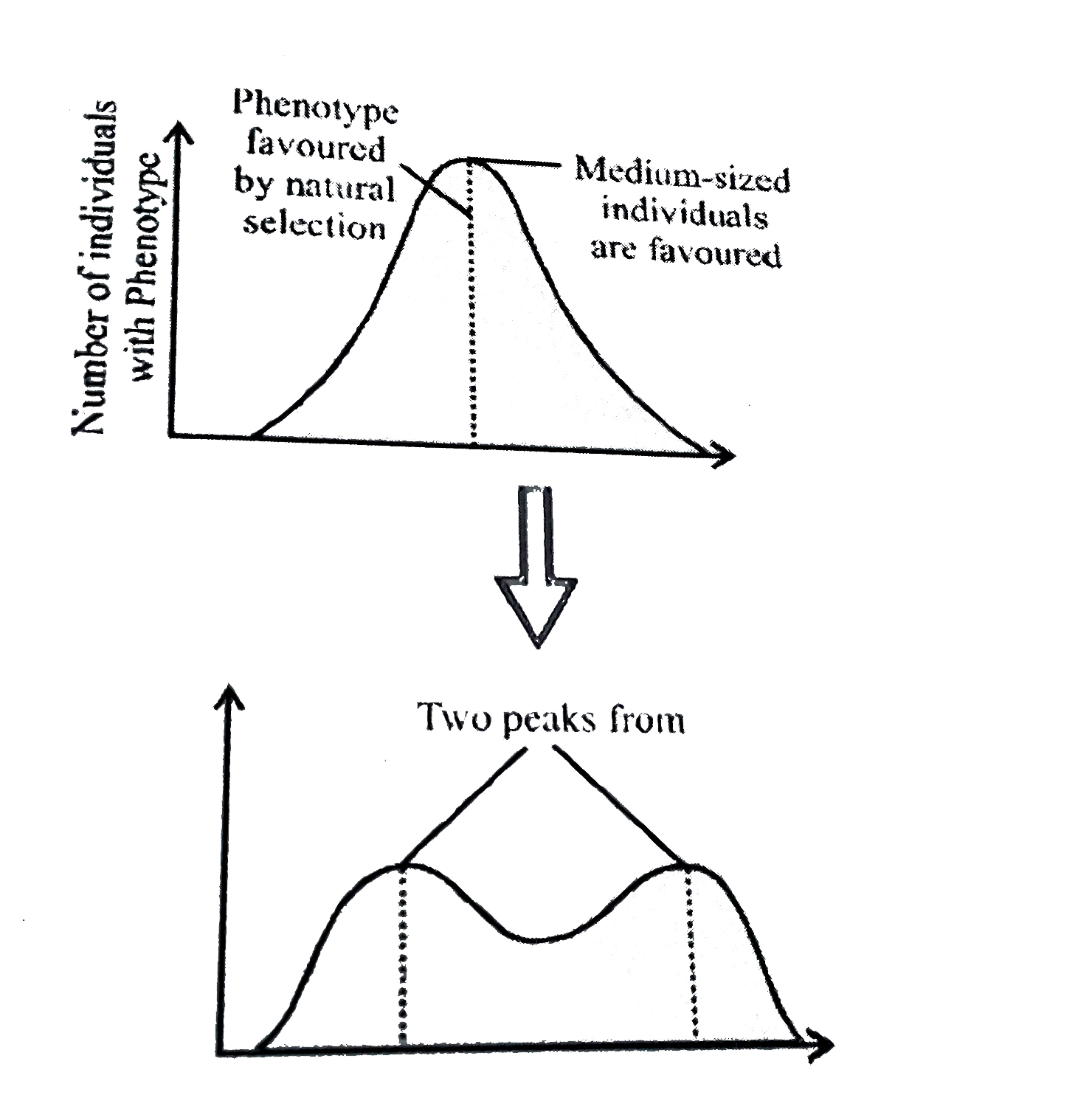Draw graph for three types of natural selection.
Video Solution
Text Solution
Three types of Natural selection : (i) Stabilizing selection: In stabilizing selection, a harmful allele is allowed to perist in population as heterozygotes (intermediates) have better survial values than the individuals with extreme expressions , so favours the indiviuals with average phenotypes. It redues variance but does not change the mesn value e.g In sickle cell anamia,recessive homozygotes (Hb∗Hb∗) die before sexual maturity due to the homozygostiy of lethal gene so the RBCs become sickle-shaped and undergo early haemolysis. On the other hand, homogous dominate (Hb∧Hb∧) though do not suffer from sickle - cell anaemia but are highly susceptible to malarial attack. The heterozygotes (Hb∧Hbs) have batter chances of survival and reprodution. These balance the loss of homozygote : so the natural selection is called stabilizing selection.
(ii) Directional selection : Replacement of light - colourred moth (Bistom betularia) by dark- coloured moth (B. carbonaria) due to industrial smoke is called industrial melanism .
In Pre-industrial revaolution period. there was abundantly present a light coloured moth which was well adapted to defend itself from the predatory birds. It used to rest during day time on light- coloured, lichen - covered turnks of oak trees. Which advent of industrial revolution , smoke discharged killed the lichens and darkened the tree trunks so the white coloured moth was easily noticed and killed by the birds. The a melanic and darkened the tree trunks so the white coloured moth was wasily noticed and killed by the birds. Then a melanic moth with dominant gene mutation was noticed which within a few decads dominated the area due to better chances of surviaval and higher rate of reproduction. Industrial melanism is not an example of convergent evolution but is an example of Progressive or Directional selection.
(iii) Disruptive selection: It is a type of natural selection which favours organisms with extreme expression of certain traits to increase variance in the population. It breaks a homogenous popution into many adaptive forms and most of the members with mean expression are eliminated . So it produces two peaks in the distribution of a traith e.g on a sea rork. both white mean expression are eliminated . So it produces two peaks in the distribution of trait e.g. on a sea rock. both white and black coloured snails are favoured but brown coloured snalls are eaten by predators and are eliminated gradually.
|
Updated on:21/07/2023
Topper's Solved these Questions
- BOOK - MODERN PUBLICATIONCHAPTER - EVOLUTIONEXERCISE - CHAPTER PRACTICE TEST (SECTION-D)(CASE-BASED SHORT ANWER )(THREE MARK EACH)2videos
EVOLUTION
- BOOK - MODERN PUBLICATIONCHAPTER - EVOLUTIONEXERCISE - CHAPTER PRACTICE TEST (SECTION-B)(SHORT ANSWER TYPE - I QUSTIONS )(TWO MARK EACH)5videos
EVOLUTION
- BOOK - MODERN PUBLICATIONCHAPTER - ECOSYSTEM EXERCISE - Chapter Practice Test (Section - D) (Case - Based Short Answer Type Questions)5videos
ECOSYSTEM
- BOOK - MODERN PUBLICATIONCHAPTER - HUMAN HEALTH AND DISEASESEXERCISE - Chapter Practice Test2videos
HUMAN HEALTH AND DISEASES
Similar Questions
Knowledge Check
- Question 1 - Select One
Which of the following features are true for stabilising type of natural selection ?
ASelection of average individualBIt reduces variationCIt is bell-shapedDAll of the above - Question 2 - Select One
Which of the following types of natural selection results to form a higher and narrower peak after the selection process ?
AStabilising SelectionBDirectional SelectionCBalancing SelectionDDisruptive Selection
(a) State Hardy Weinberg principle. Name any two factors which affect it.
(b) Draw a graph to show that natural selection leads to directional change.View SolutionDraw graph of x<−y
View SolutionWhich of the following types of natural selection is most common during periods of environmental changes like global warming?
View Solution
This diagrammatic representation shows which type of natural selection.View SolutionDraw graph of y = sin x
View SolutionMimicry || Types OF Natural Selection
View Solution
